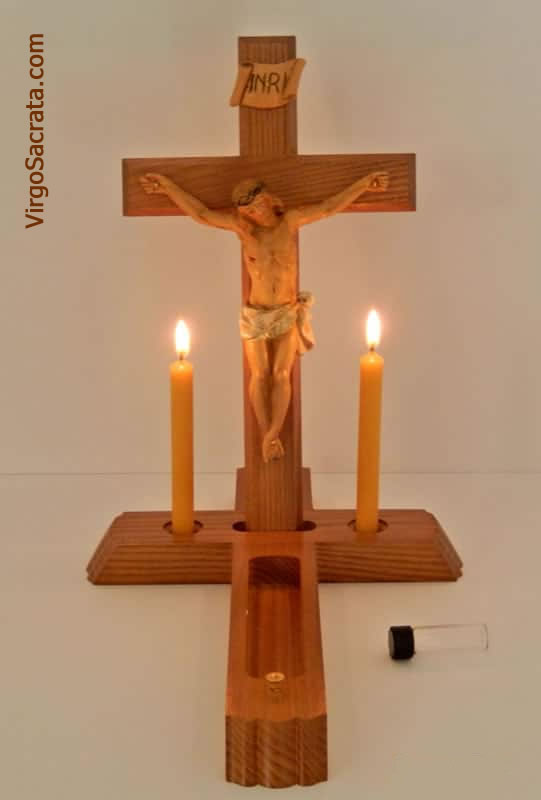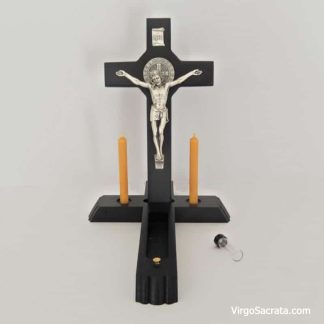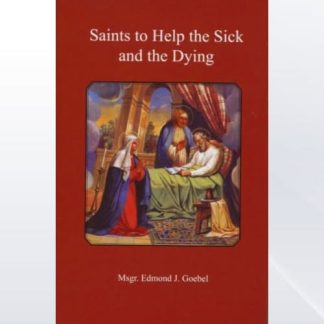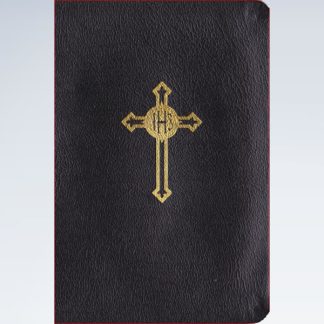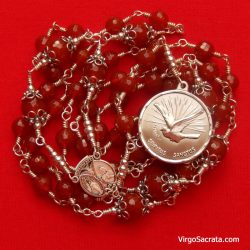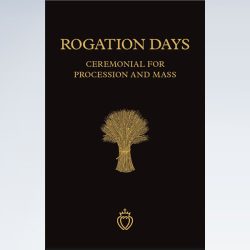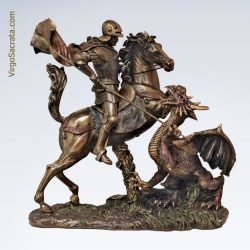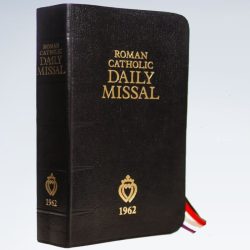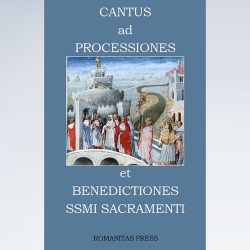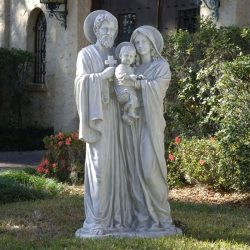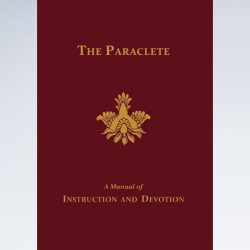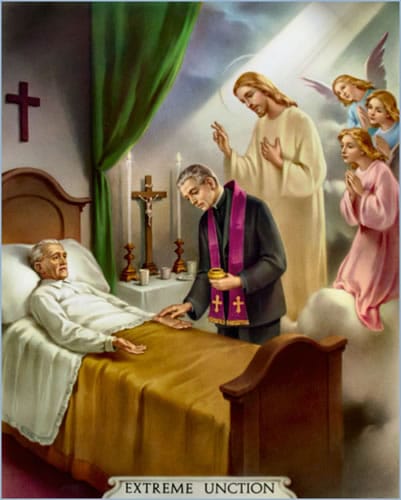

The following guide on the Anointing of the Sick comes from an informative and rare book: “Saints to Help the Sick and the Dying“. The purpose of this book is to bring before the minds of the faithful, in all walks of life, priests and Religious as well, the various saints who are invoked against specific ailments and diseases. The book also includes a chapter on the Sacraments of Confession, Communion of the Sick, and the Last Rite prayers (the rite is sublime) from the Roman Ritual.
THE ANOINTING
IN THE sorrow-laden hour of sickness we turn to the Church for consolation. When all else seems hopeless, she comes to resign the soul to death and to God in the solemn simplicity of the Sacrament of Extreme Unction. And whether it be in the black silence of night or during the noisy noonday, the presence of the priest in that intense moment bespeaks the coming of Christ and the “peace” of His mission.
Happily, the foolish superstition of yesterday is passing, and the practice of calling the priest at the beginning of serious sickness is no longer feared. In danger of death there is no room for delay or “false kindness,” but rather, it is a time for haste, which to the soul is “genuine kindness.” Difficult though it may be, the sting quickly vanishes when we realize that, in its effects, Extreme Unction is to give peace to the soul at a time when the soul needs it most. Truly, the wise virgins with their oil are to be commended more than the foolish virgins, even though the coming of the Bridegroom may be long delayed.
It is an added comfort to know that the mercy of God has provided this sacrament for us in the hour of need to serve as a healing unction when both body and soul are racked by the menace of death. In inspired words, St. James assures us:
“Is any one sick among you? Let him bring in the priests of the Church, and let them pray over him, anointing him with oil in the name of the Lord. And the prayer of faith shall save the sick man, and the Lord shall raise him up; and if he be in sins, they shall be forgiven him; confess, therefore, your sins one to another and pray one for another that you may be saved, for the continual prayer of a just man availeth much” (]as. 5, 14-16).
So too, sitting in council, the Fathers of Trent wrote:
“This effect is the grace of the Holy Ghost, whose Unction blots out sins, if any remain to be expiated, and the consequences of sin, and raises up and strengthens the soul of the sick person by exciting in him a great confidence in the divine mercy, sustained by which he bears more easily the troubles and sufferings of his sickness and more easily resists the temptations of the devil lying in wait . .. and at times when it is r.xpedient for the soul’s salvation, restores health.”
With these divine pledges, the priest in the role of Another Christ approaches the sick. Vested in sacerdotal robes, he offers him a crucifix piously to kiss; sprinkles him, the room and the faithful kneeling by, with holy water in the form of a cross. After reciting the prescribed prayers, he anoints in the form of a cross the eyes, the ears, the nostrils, the lips, the hands and the feet of the sick, beseeching the God of Mercy to forgive whatever sins he may have so committed. He prays: “By this holy anointing, and by His most tender mercy, may the Lord forgive thee whatever thou hast done amiss by sight, hearing, smell, speech, taste, touch, and walk.”
What a remarkable Sacrament! Its efficacy is so great that even the unconscious may receive its effects. In such cases, however, the sacramental fruits depend on whether the person has, at some time, expressed the wish to die a Catholic or to make his peace with God before his death. Similarly, Extreme Unction may be administered even after apparent death. According to medical authority, actual death – separation of soul and body – may not take place for a half hour or an hour (sometimes even longer) after the patient has ceased to manifest any sign of life. Under such circumstances, though the priest administers the Sacrament conditionally, the anointing may still be efficacious in saving a soul for God.
In the light of faith, Extreme Unction may be looked upon as the final triumph of God’s tenderness towards mankind. Certainly, there is no room for fear in a Sacrament so abounding in love-extending salvation to man almost in spite of his own weakness. No wonder, then, that the Church exhorts us to pray for the grace of a happy death that, strengthened by this unction, we may be prepared for entrance into eternal life.
REMEMBER
1. Call the priest at the first signs of serious sickness!
2. In case of accident or sudden death, do not fail to call the priest, even though the doctor has pronounced the person dead.
MEETING THE PRIEST WITH A LIGHTED CANDLE
3. When the priest comes to give Holy Communion to the sick, it is a Catholic custom to meet him with a lighted blessed candle as he enters the house with the Blessed Sacrament.
If possible, there should be: a small table covered with a linen cloth; Holy Water for the Asperges; a glass of water and a spoon; a crucifix; and one or two lighted candles. These should be of beeswax and blessed.
TABLE IN THE SICK-ROOM
What You Should Have on a Sick-room
– Table Cover table with clean white cloth.
– Crucifix.
– Two candlesticks with beeswax candles lighted.
– Finger-bowl with water.
– Glass of water.
– Spoon.
– Holy Water bottle and sprinkler.
– Saucer with small balls of cotton.
– Napkin.
– Saucer with little pieces of bread and lemon.
4. In case of Extreme Unction, add to the above: a small plate with salt or small piece of bread and lemon (used for cleansing the priest’s fingers after anointing); a basin with water and a towel.
5. When Holy Communion is given as “Viaticum,” it is not required that the sick person be fasting.
6. Frequently the anointing and prayers of the priest restore bodily health.
7. When there is a delay in the priest’s arrival, in emergency cases, make an Act of Perfect Contrition, or help the sick to make such an Act.
8. An Act of Perfect Contrition is an act of sorrow for our sins inspired by love of God, whom we love above all things, and who is Himself infinitely good and deserving of all our love.
9. A Catholic’s Last Will and Testament, if it be a truly Catholic one, provides for Masses to be offered for the deceased, and if possible an appropriate bequest to Catholic charity.
10. Be it never said of that hour of need — too Late!”
Some notes:
- Your priest may ask if you have a sick-call set. This special crucifix is available from Virgo Sacrata, along with other related articles of faith from the Last Rites section of our site.
- Even when a person displays all the usual manifestations of death, the soul may still not have departed from the body. Therefore, the Church allows Extreme Unction to be administered for an item after “death” has occurred.
- Catholics are forbidden to have their bodies cremated, except in case of a serious public necessity. The Catholic burial service is denied those who give orders to have their bodies cremated.
- In order to pray for the repose of the person’s soul, and to pray for the family, the best way is to arrange the Traditional Mass.

VIRGÓ SACRÁTA is a Christian mission-driven online resource and shop inspired from the beauty of Catholic faith, tradition, and arts. Our mission is to “Restore All Things to Christ!”, in continuing the legacy of Pope St. Pius X under the patronage of the Blessed Virgin Mary. “Who is she that cometh forth as the morning rising, fair as the moon, bright as the sun, terrible as an army set in battle array?” O Mary, conceived without sin, pray for us who have recourse to Thee.

